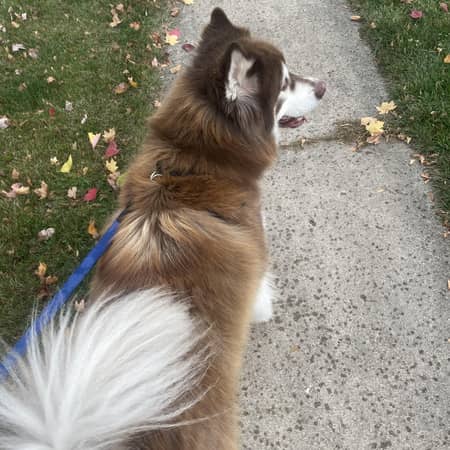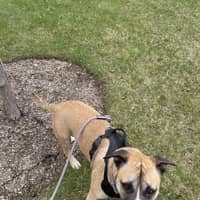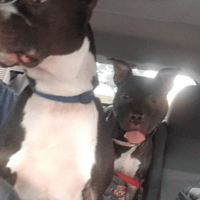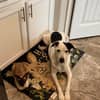

Kyle R.
Yorkville, IL





Jobs a real walk in the park
Pet care experience
I have had animals apart of my life since I was born! Although we do not currently own any pets since we love to travel we love taking part of pet sitting and dog walking! We started asking our neighbors if we could spend some time with their pups after seeing our son was scared of dogs as a simple way to help introduce him into the world of joy that comes with owning a dog. And throughout the process we got to meet so many different dogs and fell in love with learning all the different personalities and quirks each dog had. Since my fiancé and I both work from home we thought why not look into doing this more regularly! Which lead us to joining Rover! So here we are ready to help our neighbors with any of their pet needs! Looking forward to spoiling your fur babies! From my pack to yours, I can’t wait to hear from you!
Reviews



Kyle does such a good job with our 3 babies, and we never have to worry about leaving home for a few hours when he's in charge!

5 Star piece of mind every time I count on Kyle to care for my senior dog. Love the check-ins and it's nice knowing I'll come home to a happy dog! Kyle is the best, hands down.

Kyle is awesome!

Kyle was great! Got lots of updates on how Grace was doing throughout my time away. Thank you so much Kyle for taking such good care of my baby while I was away!
About Kyle R.
Communication
Skills
Safety, trust & environment
Initial consultation: Meet with the client to discuss their pet's routine, dietary needs, medical history, and any specific instructions. Take note of emergency contact information and inform the client about your availability. Maintain the pet's routine: Stick to the pet's established schedule for feeding, walking, playtime, and medication administration, if required. Consistency helps reduce stress for the pet. Safety and security: Ensure that the home is secure and that the pet cannot escape. Keep an eye out for potential hazards, such as open windows, toxic substances, or small objects that the pet could ingest. Exercise and play: Provide the pet with sufficient exercise and mental stimulation according to their needs. Take dogs for walks, engage them in play, or follow any specific exercise routines requested by the client. Food and water: Follow the client's instructions regarding feeding schedules, portion sizes, and dietary restrictions. Ensure that fresh water is always available. Monitoring and interaction: Spend quality time with the pet, offering companionship, affection, and socialization. Observe their behavior, appetite, and overall well-being, reporting any concerns to the client.
Home
Information Kyle R. would like to know about your pet
Obtain information about the dog's medical history, including any known allergies, ongoing health conditions, medications they are currently taking, or any recent surgeries or treatments. This helps in understanding their specific needs and addressing any health concerns appropriately. Vaccination Records: Ask for the dog's vaccination records to ensure they are up to date on core vaccinations, such as rabies, distemper, and parvovirus. This is crucial for protecting the dog's health and the health of other animals they may come into contact with. Behavioral Information: Gather insights into the dog's behavior, temperament, and any known triggers that may cause anxiety or aggression. Understanding their personality helps you tailor your approach and provide appropriate guidance, training, and socialization. Feeding Routine and Dietary Needs: Inquire about the dog's feeding schedule, portion sizes, and dietary restrictions. Some dogs may have specific dietary needs or require a special diet due to allergies or medical conditions. Ensuring they receive the right food in the correct amounts is vital for their health. Exercise and Activity Requirements: Learn about the dog's exercise needs and preferred activities. Different breeds and individual dogs have varying energy levels and exercise requirements. Some may thrive with long walks or vigorous play sessions, while others may have more moderate exercise needs. Training and Commands: Determine the dog's level of training and familiarity with basic commands. This information helps you maintain consistency in their training and reinforce any existing skills. It also enables you to work on new commands or address specific behavior concerns effectively. Emergency Contacts: Obtain contact information for the dog's owner or primary caregiver, as well as any emergency contacts they have provided. It's crucial to have a reliable point of contact in case of any unforeseen situations or emergencies.
A typical day
Play Fetch: Dogs love chasing after and retrieving toys or balls. Find an open area, such as a park or backyard, and throw a ball or a toy for the dog to fetch. It's a great way to exercise them and engage their natural instincts. Go for Walks or Hikes: Dogs enjoy exploring the outdoors and going on walks or hikes. Take them to a nearby park, trail, or beach, and let them experience new sights and smells. It's not only physically stimulating for the dog but also a chance for them to bond with you. Puzzle Toys and Treat Dispensers: Interactive puzzle toys or treat dispensers can provide mental stimulation and entertainment for dogs. These toys challenge their problem-solving skills and keep them occupied as they figure out how to access the treats or solve the puzzle. Obedience Training: Engaging in obedience training with dogs can be both fun and rewarding. Teach them new commands or tricks using positive reinforcement techniques. It strengthens the bond between you and the dog while promoting their mental and emotional well-being. Doggy Playdates: If the dog you're watching is sociable and gets along well with other dogs, consider arranging playdates with other friendly dogs. It provides an opportunity for them to socialize, exercise, and have fun together under supervision. Agility Training: Set up an agility course using obstacles such as tunnels, jumps, and weave poles. It's a fun and challenging activity that allows dogs to showcase their agility and athleticism while improving their coordination and focus. Remember to consider the dog's individual preferences, energy levels, and any specific limitations or health concerns when planning activities. Always prioritize their safety and well-being while providing opportunities for them to have fun and enjoy themselves.
Services
Kyle can host
Kyle can watch in your home
Availability
It's important to note that every pet is unique, and their individual needs may vary. Owners should tailor their routines to accommodate their pet's specific requirements, age, breed, and health conditions. Flexibility and adaptability are key to ensuring the well-being and happiness of your pet within your daily or weekly schedule.
About Kyle R.
Communication
Skills
Safety, trust & environment
Initial consultation: Meet with the client to discuss their pet's routine, dietary needs, medical history, and any specific instructions. Take note of emergency contact information and inform the client about your availability. Maintain the pet's routine: Stick to the pet's established schedule for feeding, walking, playtime, and medication administration, if required. Consistency helps reduce stress for the pet. Safety and security: Ensure that the home is secure and that the pet cannot escape. Keep an eye out for potential hazards, such as open windows, toxic substances, or small objects that the pet could ingest. Exercise and play: Provide the pet with sufficient exercise and mental stimulation according to their needs. Take dogs for walks, engage them in play, or follow any specific exercise routines requested by the client. Food and water: Follow the client's instructions regarding feeding schedules, portion sizes, and dietary restrictions. Ensure that fresh water is always available. Monitoring and interaction: Spend quality time with the pet, offering companionship, affection, and socialization. Observe their behavior, appetite, and overall well-being, reporting any concerns to the client.
Home
Information Kyle R. would like to know about your pet
Obtain information about the dog's medical history, including any known allergies, ongoing health conditions, medications they are currently taking, or any recent surgeries or treatments. This helps in understanding their specific needs and addressing any health concerns appropriately. Vaccination Records: Ask for the dog's vaccination records to ensure they are up to date on core vaccinations, such as rabies, distemper, and parvovirus. This is crucial for protecting the dog's health and the health of other animals they may come into contact with. Behavioral Information: Gather insights into the dog's behavior, temperament, and any known triggers that may cause anxiety or aggression. Understanding their personality helps you tailor your approach and provide appropriate guidance, training, and socialization. Feeding Routine and Dietary Needs: Inquire about the dog's feeding schedule, portion sizes, and dietary restrictions. Some dogs may have specific dietary needs or require a special diet due to allergies or medical conditions. Ensuring they receive the right food in the correct amounts is vital for their health. Exercise and Activity Requirements: Learn about the dog's exercise needs and preferred activities. Different breeds and individual dogs have varying energy levels and exercise requirements. Some may thrive with long walks or vigorous play sessions, while others may have more moderate exercise needs. Training and Commands: Determine the dog's level of training and familiarity with basic commands. This information helps you maintain consistency in their training and reinforce any existing skills. It also enables you to work on new commands or address specific behavior concerns effectively. Emergency Contacts: Obtain contact information for the dog's owner or primary caregiver, as well as any emergency contacts they have provided. It's crucial to have a reliable point of contact in case of any unforeseen situations or emergencies.
A typical day
Play Fetch: Dogs love chasing after and retrieving toys or balls. Find an open area, such as a park or backyard, and throw a ball or a toy for the dog to fetch. It's a great way to exercise them and engage their natural instincts. Go for Walks or Hikes: Dogs enjoy exploring the outdoors and going on walks or hikes. Take them to a nearby park, trail, or beach, and let them experience new sights and smells. It's not only physically stimulating for the dog but also a chance for them to bond with you. Puzzle Toys and Treat Dispensers: Interactive puzzle toys or treat dispensers can provide mental stimulation and entertainment for dogs. These toys challenge their problem-solving skills and keep them occupied as they figure out how to access the treats or solve the puzzle. Obedience Training: Engaging in obedience training with dogs can be both fun and rewarding. Teach them new commands or tricks using positive reinforcement techniques. It strengthens the bond between you and the dog while promoting their mental and emotional well-being. Doggy Playdates: If the dog you're watching is sociable and gets along well with other dogs, consider arranging playdates with other friendly dogs. It provides an opportunity for them to socialize, exercise, and have fun together under supervision. Agility Training: Set up an agility course using obstacles such as tunnels, jumps, and weave poles. It's a fun and challenging activity that allows dogs to showcase their agility and athleticism while improving their coordination and focus. Remember to consider the dog's individual preferences, energy levels, and any specific limitations or health concerns when planning activities. Always prioritize their safety and well-being while providing opportunities for them to have fun and enjoy themselves.
Location
Yorkville, IL


Kyle R.
Yorkville, IL
